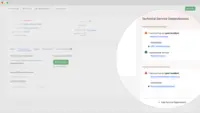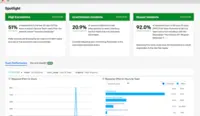PagerDuty is the right fit for our needs
This supports real-time support which is required as we conduct live meetings that are virtual, hybrid, and onsite local network setup. …

PagerDuty is an IT alert and incident management application from the company of the same name in San Francisco.
Products that are considered exceptional by their customers based on a variety of criteria win TrustRadius awards. Learn more about the types of TrustRadius awards to make the best purchase decision. More about TrustRadius Awards
| Deployment Types | Software as a Service (SaaS), Cloud, or Web-Based |
|---|---|
| Operating Systems | Unspecified |
| Mobile Application | Apple iOS, Android, Mobile Web |
![Screenshot of Similar Incidents [Apple iPad], Open Incidents [iPhone 8], On-Call Schedule Menu [Apple Watch])](/_next/image?url=https%3A%2F%2Fmedia.trustradius.com%2Fproduct-screenshots%2FIp%2FBX%2FL6SIK3HGD31M-200x200.png&w=384&q=75)

